THE TEAM

Jon Hawkings (he, him)
Assistant Professor in Earth and Environmental Science
Jon is an environmental biogeochemist originally from the United Kingdom. He received his undergraduate degree in Physical Geography from the University of Bristol. It was at Bristol that he fell in love with ice and biogeochemistry. He graduated with a MSci degree in 2009, went to Svalbard as a research assistant for three months and then took a break from academia.
In 2011, he returned to the University of Bristol to undertake a PhD in Polar Biogeochemistry with Jemma Wadham and Martyn Tranter, graduating in 2015. He was a postdoctoral research associate for three years also at the University of Bristol and worked on three projects, two as Researcher Co-I. In 2018 he was awarded a European Commission funded Marie Skłodowska-Curie Actions Global Fellowship where he spent three years working with Rob Spencer’s lab at Florida State University and Liane Benning’s lab at GFZ Potsdam.
Jon joined Penn in the fall of 2021 as Assistant Professor of Earth and Environmental Science and leads the Penn BiCycles Lab.
In his spare time he enjoys cooking (especially Indian food), playing and watching football (the round ball kind), a good movie, anything in the great outdoors and marmite.
A full list of Jon’s publications can be found on Google Scholar. He also has a ResearchGate profile.

Jack Murphy (he, him)
Postdoctoral Researcher
Jack is a geochemist and Earth Historian fascinated by the complexity and long-term stability of The Earth System. As an undergraduate studying condensed matter physics at Bates College, he was introduced to the geosciences by way of “The Earth System” by Kump, Kasting, and Crane. As it turns out, Earth itself is an incredibly interesting and complex chemical system (especially when compared to low-temperature excitons in gallium arsenide wafers). Couple the purely academic merits of investigating the Earth System with humanities existential need to understand the mechanisms that control Earth’s climate, and Jack was hooked. After serving as a Peace Corps Volunteer in Lesotho and a science faculty member at Solebury School, he joined the Geosciences department at Princeton University as a PhD candidate advised by Professor John Higgins. In June 2022, Jack joined the Penn BiCycles Lab as Senior Research Coordinator where he has the pleasure of working on exciting topics with an exceptional team of students and researchers.
Jack’s research is motivated by two centralizing questions: (1) How has Earth remained habitable for 3+ billion years? Despite an increase in solar luminosity of ~30% over Earth History, there is abundant evidence for liquid water and life on Earth’s surface throughout its long history. This observation requires that Earth’s interconnected global biogeochemical cycles include feedbacks that maintain relatively stability of Earth’s surface environment, with the notable exception of several Snowball Earth events, (2) How is the Earth System responding to contemporary anthropogenic forcings? While Earth’s climate and biological systems have undergone dramatic changes in the past, almost never* has the rate of change been as dramatic as we are witnessing today, driven by human activity. The tools employed in these investigations include field observations, analytical geochemistry, and numerical modeling.
* The notable exception potentially being bolide impact events.
Outside of academic pursuits, Jack enjoys traveling to remote corners of the map, elevating his heart-rate in the presence of an oxygenated atmosphere, pointing out cool rocks and plants to his 2yo daughter (or vice versa), and attempting to be an at minimum half-way decent denizen of Earth.
Jack’s research can be found at Google Scholar and ResearchGate.

Eva Doting (she, her)
Postdoctoral Researcher
Eva is an environmental biogeochemist from the Netherlands. In 2016, she completed her BSc in Chemistry at the University of Groningen and moved to an equally flat country (Denmark) to pursue a MSc in Environmental Science at the University of Copenhagen. Here, her interest in using analytical chemistry techniques to address the environmental challenges that some of the most sensitive regions of our planet are facing was sparked. In 2019, she started a PhD in Arctic Biogeochemistry at the Aarhus University Department of Environmental Science, supervised by Alexandre Anesio and Martin Hansen. Eva’s research focussed on (volatile) organic carbon produced by supraglacial microbial communities, its potential roles in microbe-microbe interactions and understanding the transformation and export of organic carbon on and from the ice sheet surface.
In January 2023, she joined the Penn BiCycles Lab as a postdoctoral researcher.
In her spare time, Eva loves going places that are less flat than the Netherlands or Denmark to go hiking, camping or skiing and to have snack-breaks in pretty places. If she can’t be outside, she enjoys going to cute cafes, reading and spending time with friends and family.

Loïc Piret (he, him)
BAEF Postdoctoral Scholar
Loic is a Belgian earth scientist who studies the geochemistry and sedimentology of glacial mud, predominantly in Patagonian fjords. He obtained his BSc and MSc in Geology at Ghent University in 2014 and 2016, respectively. In September 2016, he began working as a teaching assistant and PhD student at the Renard Centre of Marine Geology at Ghent University, under the supervision of Prof. Sébastien Bertrand. During his PhD, he investigated how glacier dynamics are recorded in proglacial lake and fjord sediments. To do so, Loic regularly participated in field expeditions to the fjords and lakes in Chilean Patagonia and used a broad range of sedimentological analytical techniques in combination with remote sensing analyses. Loic joined the Penn BiCycles team in October 2023 as a postdoctoral researcher through a fellowship from the Belgian American Educational Foundation. At the Penn BiCycles lab, Loic’s primary research focus is to unravel how glacially-derived elements behave in the Patagonian fjord systems.
In parallel to his academic career, Loic advocates for stronger connections between scientists and policymakers, as demonstrated by his voluntary efforts in the science-for-policy working group of EuroScience and by his attendance at the discussions in the European Parliament on the nature restoration law. He received the Young Geoscientist award from EuroGeoSurveys in 2022 for his efforts in strengthening the scientist-policymaker relations in Europe.
Loic’s research can be found on ResearchGate and Google Scholar.
To relax, Loic enjoys a good bike ride (coming from Flanders, he is ofcourse a true Flandrien) and plays the guitar at a sub-mediocre level. Next to his experiments in the lab, he loves to experiment with new recipes in the kitchen with variable yet noteworthy results. After a rainy weekend day filled with a miserable bike ride, broken guitar strings, and failed recipes, Loic loves to wind down with a refreshing beer at a bar in good company.
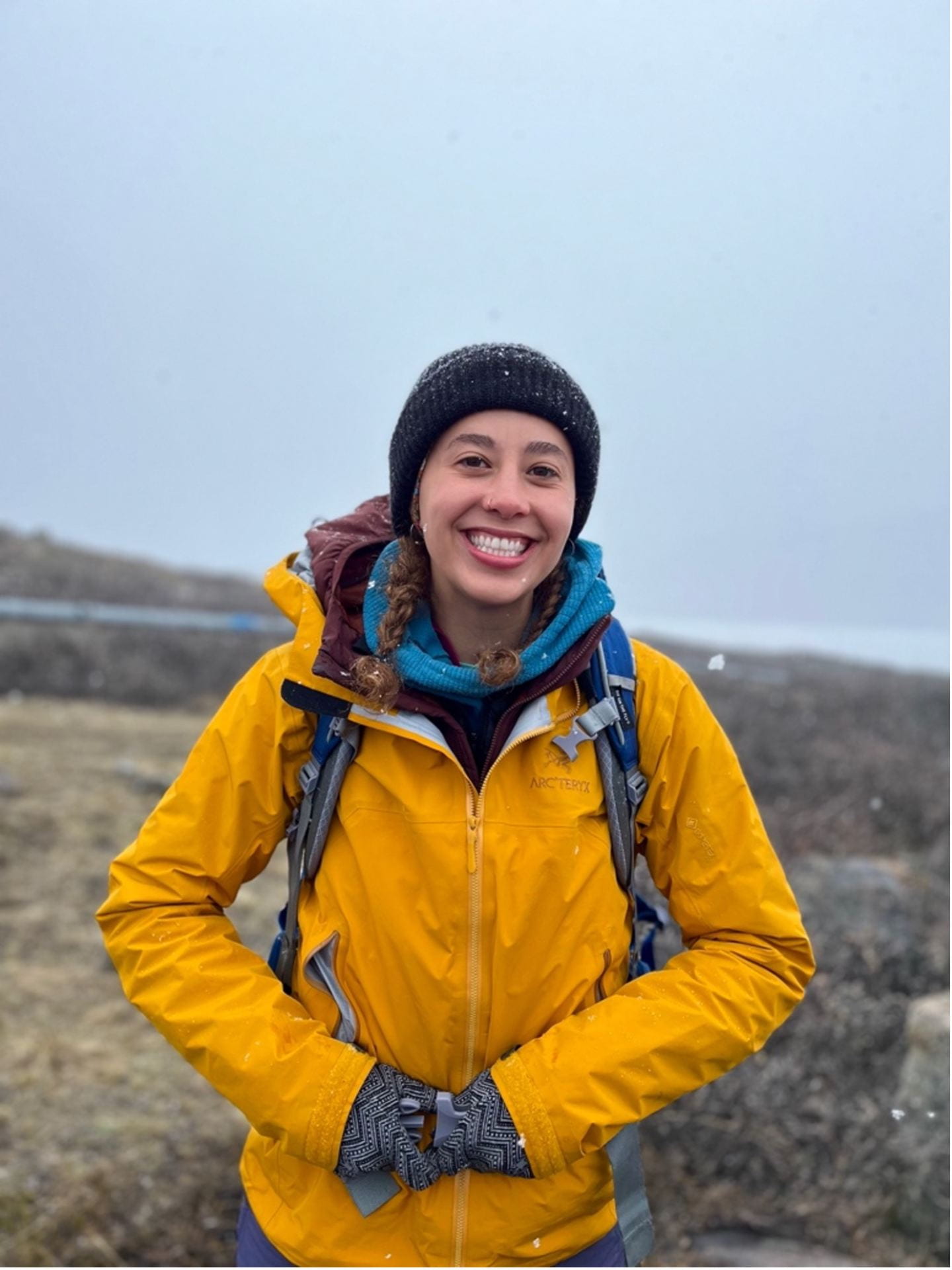
Amina Youssef (she, her)
PhD Student
Amina is now a second-year Ph.D. student in the BiCycles Lab. She began her Ph.D. in August 2022 as a Penn Presidential Fellow, selected among the most diverse doctoral students at Penn. In the lab, Amina is currently working on understanding mercury (Hg) cycling and export from the Greenland Ice Sheet. She spent most of the 2023 summer (May-July) on fieldwork in Kangerlussuaq, Greenland, collecting glacial meltwater samples for this project. The focus of the field season was to begin investigating the deposition, storage, cycling, and efflux of Hg and determine the role of the Greenland Ice Sheet hydrology and subglacial biogeochemical processes in Hg transformation, mobilization, and supply. Her project aims to fill current gaps in knowledge on Arctic Hg cycling and the potential impacts the toxic element might have on Arctic marine ecosystems.
Before starting her Ph.D., Amina graduated magna cum laude from Whitman College in Walla Walla, WA with a bachelor’s degree in biology and a minor in chemistry. Amina was introduced to glaciology and environmental biogeochemistry during her undergraduate degree. Since then, she felt compelled to participate in developing a more climate-resilient world.
Amina is originally from Durango, Colorado where she grew up enjoying outdoor activities, including skiing, mountain biking, rafting, and hiking. Besides the outdoors, she loves art and photography, a good fictional book, volunteering for local community events, playing the piano, and quality time with family and friends.
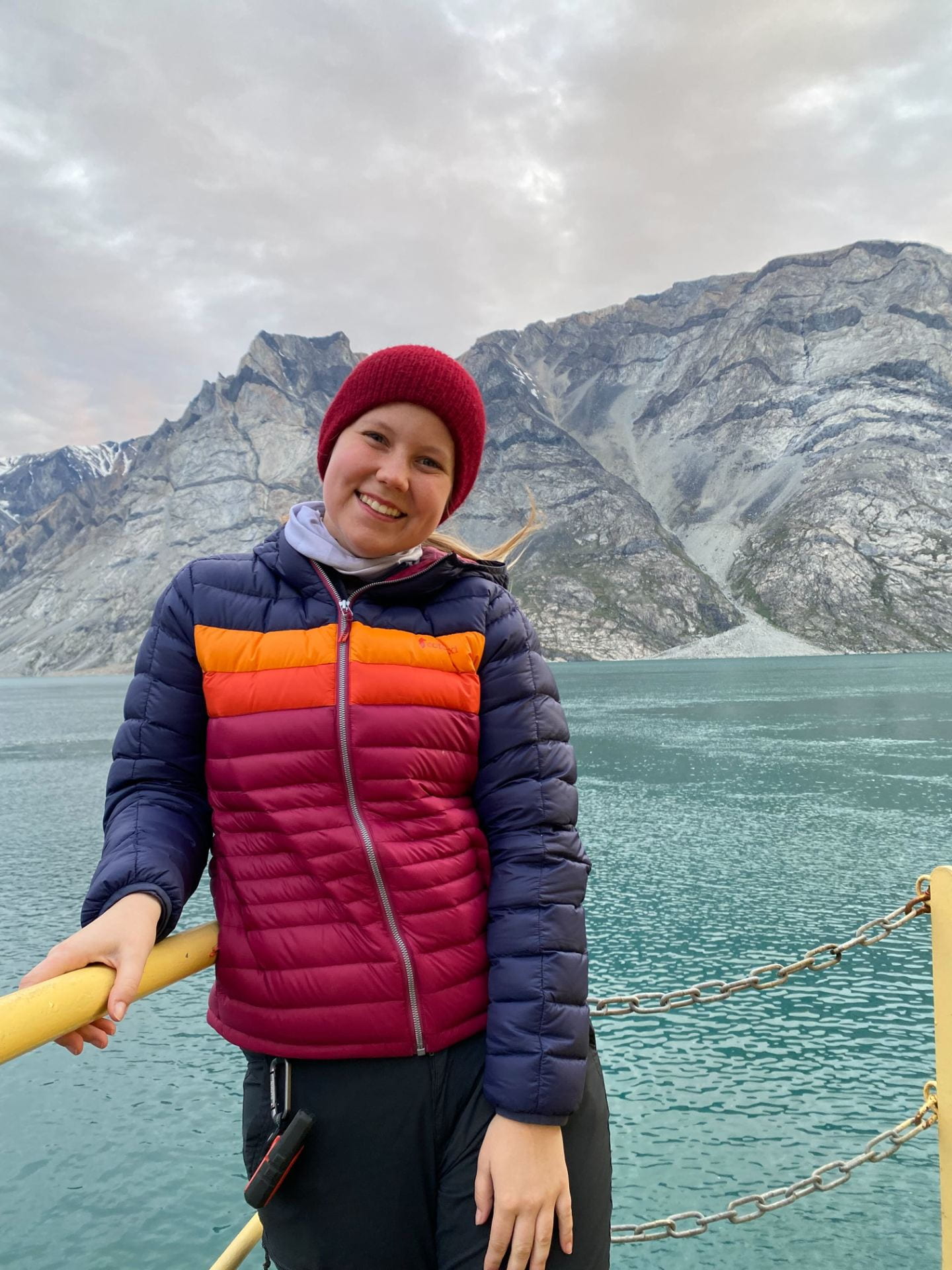
Emma Kocik (she, her)
PhD Student
Emma is a PhD student in the BiCycles Lab originally from Mission Viejo, California. In 2018, she graduated summa cum laude from Chapman University in Orange, California, receiving a B.S. in Chemistry with a minor in Environmental Science.
During her undergraduate years, she explored a wide variety of research fields ranging from aquatic chemistry to marine biology to environmental geochemistry. As a senior, she fell in love with the techniques of geochemistry, researching the sorption of toxic metals to iron oxyhydroxide nanoparticles, processes that occurs in acid mine drainage environments. Notably, she was able to travel to the Stanford Synchrotron Radiation Lightsource in Palo Alto, California to conduct synchrotron analyses on her samples, an experience that solidified her goal to attend graduate school in the geosciences.
After a gap year spent traveling, working, and (occasionally) relaxing, Emma began her work in the BiCycles Lab in July 2023 as a research assistant in Greenland and then as a PhD student beginning in Fall 2023. She is excited to apply her geochemical skillset to a part of the planet that is totally new to her, delving into questions within the realm of glacial biogeochemistry.
Outside of the lab, Emma is also passionate about science policy, communication, and teaching, and is eager to engage with these areas during her time at Penn. In her free time, she enjoys spending time in the kitchen, going on long walks, finding new coffee shops, and hanging out with her cats.
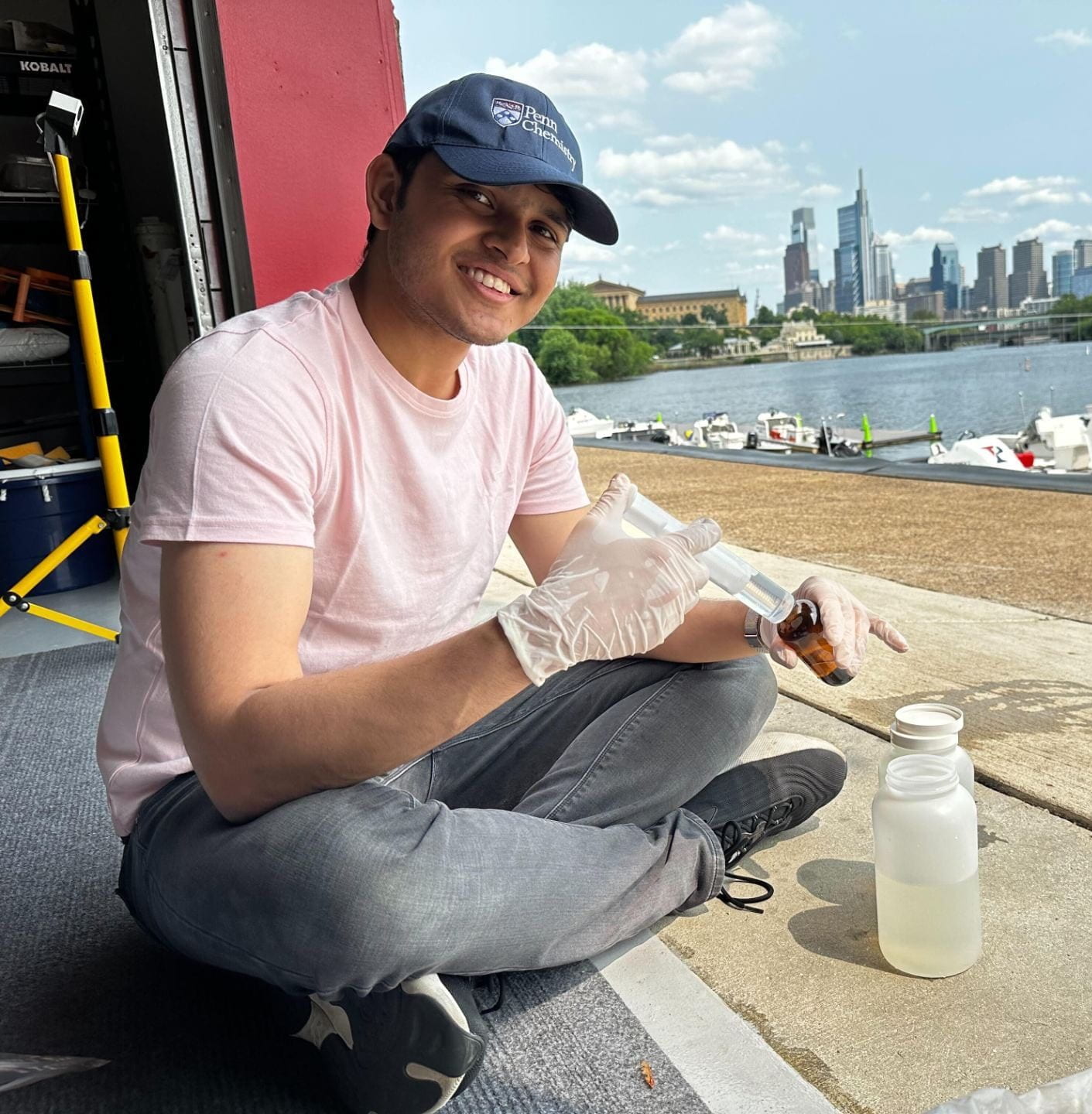
Neelavro Pal
Masters Student
Neel is an enthusiastic and driven individual pursuing a Master of Chemical Sciences with a focus on Environmental Organic Chemistry at the University of Pennsylvania. With a passion for environmental research, he aims to contribute significantly to the development of sustainable solutions to pressing global challenges.
Neel’s academic journey commenced in 2018 with a Bachelor of Technology in Oils, Oleochemicals, and Surfactants Technology from the Institute of Chemical Technology in Mumbai, India. During his undergraduate studies, he engaged in a research project where he explored chemical depolymerisation of plastic PET through solvent-assisted Glycolysis Mechanisms. This experience reinforced his understanding of polymer chemistry, sustainable materials, and recycling technologies. During a brief period as a research intern in Godrej Chemicals LTD, his role was to formulate sustainable construction materials by leveraging my expertise in green oleochemicals and surface chemistry.
At the University of Pennsylvania, he has worked closely with Dr. Marsha I. Lester as an Independent Study Researcher during the spring of 2023 to synthesize and analyze the precursor of the Criegee Intermediate. His investigations delved into the mechanism of hydroxyl radical formation from alkenes in the troposphere, and he employed Quantum Mechanical Tunnelling to quantify the presence of these radicals. The theoretical calculations he conducted have considerable implications for atmospheric chemistry research.
In the BiClycles lab, his research revolves around analyzing trace metals in Philadelphia’s water sources. His main objective is to gather water samples from various urban watershed in the Philadelphia metro area and employ advanced analytical techniques to investigate seasonal fluctuations, weather influences, location-specific factors, and the intricate transport mechanisms of trace metals within these water bodies.
He is a member of UPenn’s Graduate and Professional Student Assembly. Beyond my academic pursuits, he has discovered a newfound passion for coaching young kids from middle and high school, guiding and inspiring them to reach their full potential. During his leisure time, he indulges in diverse interests, including watching movies, exploring various cuisines, embarking on leisurely drives, and spending quality moments with friends.

Leah Hopf
Undergraduate Research Assistant
Leah is an undergraduate member of the BiCycles lab who studies Earth Science at Penn. She first joined the lab in the summer of 2023 as part of a Penn Undergraduate Research Mentoring project, for which she assisted with the lab’s 2023 field season in Greenland and spent the remainder of the summer working on iron and manganese sediment extractions. She looks forward to expanding her lab skills and supporting senior lab members’ research for the remainder of her time in college.
In her spare time, Leah enjoys any outdoor activity, which will inevitably lead to her befriending insects and collecting cool rocks. She also enjoys various crafty hobbies, reading, and staying active.

Margaux Cowles
Undergraduate Research Assistant
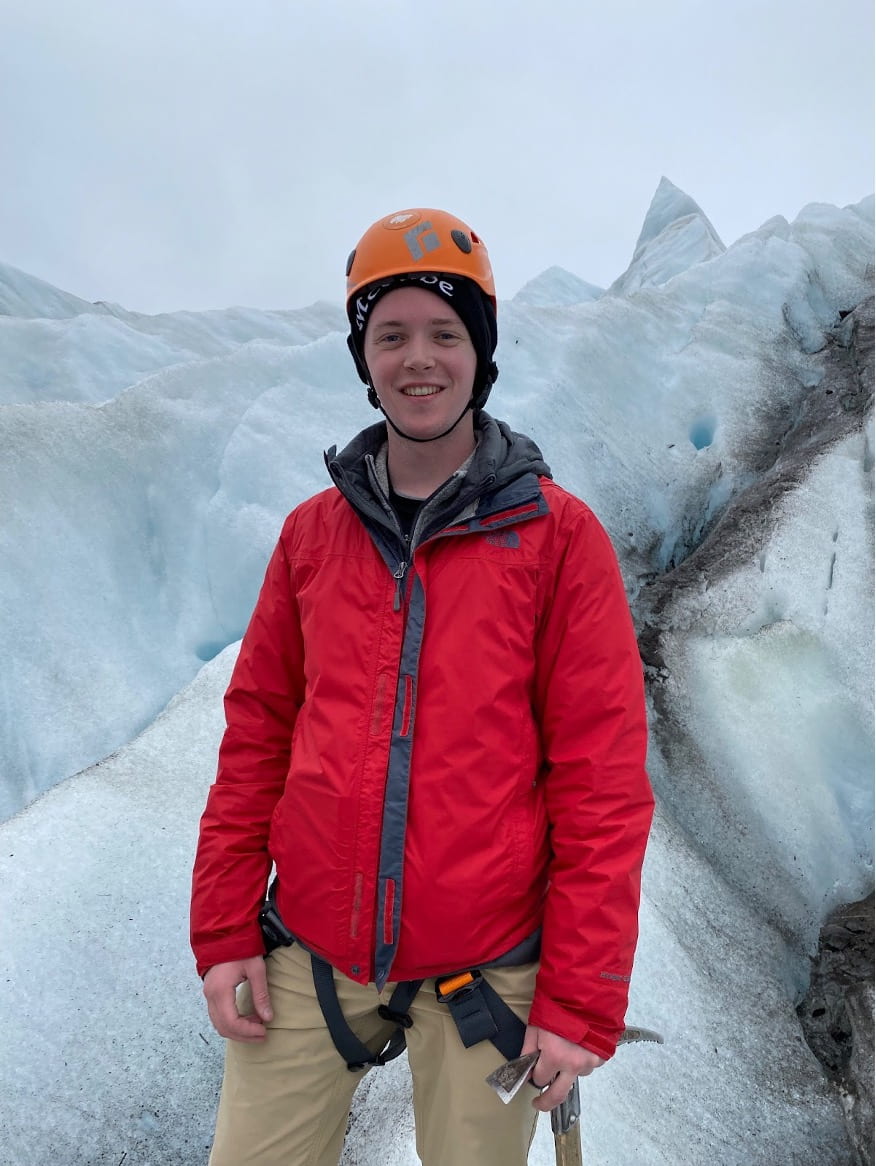
Dave McCabe (he/him)
Lab Technician
.Dave is a Penn graduate from North Wales, Pennsylvania. He’s interested in everything there is to know about plants, rocks, rivers, and animals, which is why he chose to study Earth Science with a concentration in Environmental Science for his B.Sc. His coursework in the Earth Science Department has taken him from the fields of Kennett Square, PA to Iceland, where he first saw and fell in love with glaciers, and more recently Greenland as part of an NSF project. Dave is grateful to be a part of the team and hopes to apply what he learns in the BiCycles Lab to continue studying biogeochemistry in graduate school.
Dave began his research journey with Dr. Jane Dmochowski with her Urban Vegetation Community-Based Participatory Research Project. With Jane and through the Hayden Scholars Program, he has used remote sensing and watershed modeling to investigate how impervious surface cover impacts Cobbs Creek in West Philadelphia. He is especially interested in elemental and nutrient cycling in urban environments and how humans may live more sustainably in cities.
After taking a semester off from Penn in the Fall of 2020 to work on a political campaign, Dave quickly discovered that he prefers science to politics. And because of this gap semester, he will graduate in December 2023 after studying abroad in Australia for the Fall.
Outside of research, Dave was the Cast Director for the Mask and Wig Club, a musical comedy troupe at Penn. In his spare time, he enjoys rock climbing, biking, and hiking around the Philadelphia area.
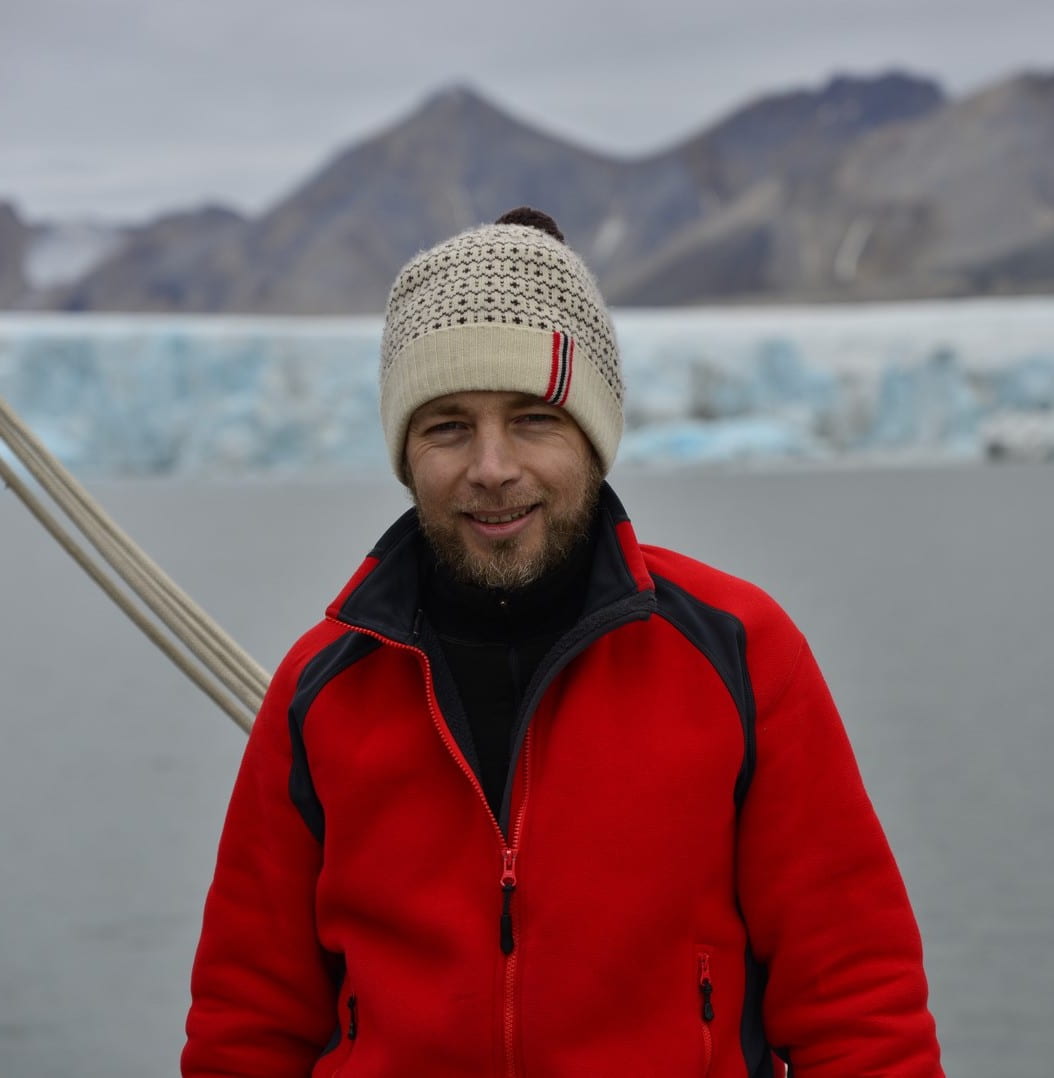
Łukasz Stachnik (he, him)
Visiting Scholar/Assistant Professor at University of Wrocław (Poland)
Łukasz is a hydrochemist studying the impact of glacier recession on biogeochemical cycles in arctic and alpine environments. His current research examines the influence of chemical and physical weathering in subglacial and proglacial environments on biological and inorganic processes affecting the carbon cycle and linked biogeochemical processes in glaciated regions.
Łukasz obtained a BSc in Biology (with a thesis focused on bear diets in Polish mountains) in 2006 at the Jagiellonian University in Poland. In 2008 he worked on a periglacial hydrology project (IV IPY) based in the Polar Urals.
Łukasz’s PhD (2008 – 2017) focused on hydrochemical process in glaciated hydrological basins, supervised by Dr. Kazimierz Krzemień and Dr. Jacob Yde. During his PhD he participated in several internships in the UK (Glasgow) and Norway (Sogndal, Oslo). In 2012/2013, he was the lab technician in an overwintering team at the Polish Polar Station on the Svalbard Archipelago in the Arctic. As PhD student, he acquired funding for four research projects funded from EU, Norway and Poland scientific institutions.
He returned to Poland from an internship at the University of Glasgow in 2017 to join the Department of Physical Geography at the University of Wrocław (Poland) as Assistant Professor. In 2021, he was awarded a one-year fellowship at Prof. Liane Benning’s lab at the GFZ Helmholtz Centre in Germany. During his time as a Visiting Scholar in the Penn BiCycles Lab Łukasz will work on several collaborative research projects and analyze water and sediment samples.
In his free time Łukasz enjoys year-round outdoor activities including trail running (he has completed several mountain marathons and is training for a 60-mile mountain race!), hiking, ski touring, and kayaking. He hopes to participate in the Philadelphia Marathon while he is in Pennsylvania. He also has a particulate interest in the history of Polish exploration and geographical discoveries in Siberia during the seventeenth to twentieth centuries.
A complete list of Łukasz’s publications could be find on Google Scholar and ResearchGate.

SydneyBlu Garcia-Yao (they/them)
Research Assistant
SydneyBlu is a high school student at Harriton High School in Bryn Mawr, Pennsylvania interested in environmental biogeochemistry, particularly emerging contaminants. First introduced to the Earth Sciences through their school’s Science Olympiad program, SydneyBlu became fascinated with freshwater and glacial systems. Then, after being selected to compete at the 2021 International Earth Science Olympiad, SydneyBlu worked with the rest of the US team to analyze microplastic levels in water systems across the country, sparking their interest in understanding environmental contaminants. Determined to learn more, SydneyBlu started researching the correlation between microplastics and coral mortality under Dr. Field at Penn’s Medical School and later presented this research at the National Junior Science and Humanities Symposium.
During the summer of 2022, SydneyBlu was an intern at the Environmental Biogeochemistry group at the Academy of Natural sciences, studying microplastics in the Delaware River Basin with the goal to create a model to predict concentrations based on environmental and anthropogenic factors.
Interested in the power of remote sensing as a research tool, at the Penn BiCycles Lab SydneyBlu has been working with QGIS and Google Earth Engine to quantify lake volumes in Greenland to better understand carbon fluxes.
Beyond research, SydneyBlu helps run the Leadership in Earth and Environmental Sciences program, a new initiative by the United States Earth Science Organization to increase opportunities for underrepresented populations interested in environmental justice.
In their spare time, they enjoy writing creative nonfiction and trying new bubble tea places.
